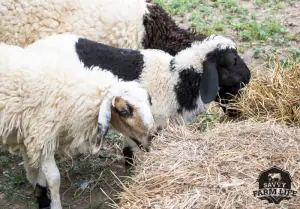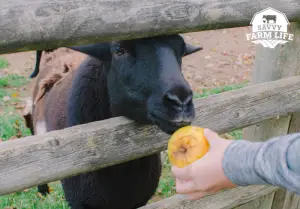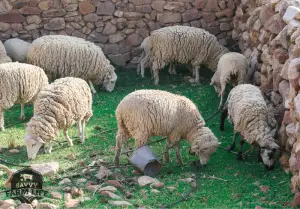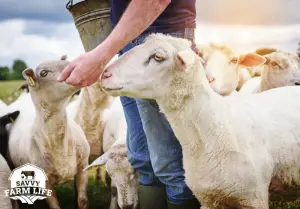Foods Sheep Can And Cannot Eat
While sheep are relatively hardy, healthy animals, they are susceptible to digestive problems caused by the ingestion of certain foods and plants. To keep a flock of healthy sheep, it is important that you know what they can and cannot eat.
So, what can can sheep eat? Sheep are herbivores and are happiest eating on pasture consisting of grasses, legumes, and forbs. When pasture is unavailable, quality hay is an excellent substitute. Feed can be supplemented with the occasional treat in the form of most vegetables, fruits, and limited grain products. Some vegetables, such as those from the nightshade and brassica family, can be harmful to sheep.
The last thing you want to do is feed a potential toxin to your sheep, so it is important to arm yourself with knowledge when it comes to caring for your flock of sheep. Read on to learn more specifics about what sheep should and shouldn’t eat.
Foods Sheep Should Eat Daily 
The diet of a sheep should consist almost entirely of healthy pasture or high-quality hay. Sheep are happiest when allowed to graze freely for a variety of grasses, legumes, and forbs (leafy weeds). Sheep can regulate their own intake when on pasture and can spend up to 12 hours grazing per day.
When adequate pasture is not available, a quality hay is the best substitute. Sheep prefer leafy, soft hay as opposed to coarser hay. They tend to do well on timothy hay, orchard hay, bluegrass, and oat hay. While sheep will gladly eat it and many flocks live on it successfully, alfalfa is not always recommended as it can be too rich for sheep, increasing the risk of bloat in addition to urinary tract problems.
In most circumstances, sheep thrive on pasture or hay alone. In some instances, though, one may wish to supplement their sheep’s diet with grain due to pregnancy, age, lactation, or malnourishment. When providing grain to your sheep, it is imperative that you choose one specifically for sheep and provide it in limited amounts. Sheep are susceptible to copper toxicity and lethal amounts can be found in many goat and other livestock feeds.
Foods Sheep Can Eat Sparingly 
There are a variety of foods that are perfectly fine (or even healthy) to offer our sheep on a limited basis. Treats should never make up a regular portion of your sheep’s diet, but they are beneficial when training, bonding, and offering a fun snack once in a while.
Fruits and vegetables that are safe to offer sheep include:
- Apples
- Apricots (pits removed)
- Beets
- Blackberries
- Blueberries
- Cantaloupe
- Carrots
- Citrus (strictly in moderation)
- Collard Greens
- Corn
- Grapes
- Peas
- Peaches (pits removed)
- Peanuts (strictly in moderation)
- Pears
- Pumpkin
- Soybeans
- Squash
- Strawberries
- Sunflower Seeds
- Watermelon
Weeds and ornamental plants that are safe for sheep to eat include:
- Agapanthus
- Bamboo
- Bay Leaves
- Cedar
- Comfrey
- Coyote Bush
- Dandelions
- Dill
- Dogwood
- Elm
- Fennel
- Fiscus
- Greenbrier
- Lavender
- Lemon Balm
- Mint
- Oregano
- Roses
- Rosemary
- Sow Thistle
- Sunflowers
- Thyme
- Yarrow
Can Sheep Eat Bread And Other Grains?
Bread is not a nutritious snack for sheep, but it is not harmful in limited quantities and the sheep sure love it. Treats that can be occasionally offered to sheep include cubed bread, animal crackers, graham crackers, unsalted pretzels, oats, and cheerios.
Keep in mind when feeding grain products, that they should be fed sparingly. Not only is grain lacking in nutritional value, but sheep are susceptible to a condition called “grain overload”. Grain overload occurs when a sheep has ingested a high amount of grain which interferes with the function of the rumen. Symptoms of grain overload include bloating, diarrhea, muscle weakness, loss of consciousness, and death.
Can Sheep Drink Beer?
Farmers have been known to give beer to their sheep on occasion with beneficial outcomes. Dark beer has loads of probiotics and anti-inflammatory properties. For sheep experiencing digestive upset, lack of appetite, or lethargy, farmers often medicate with a bottle of dark ale in the morning and another in the evening, if necessary. Though we always recommend consulting with a veterinarian if your sheep are sick, this remedy has been used throughout much of history for ailing sheep and other livestock. In fact, horses are commonly given a pint of beer after a physically demanding performance to perk them up.
Foods That Sheep Can’t Eat 
There are plenty of foods that sheep can eat, but unfortunately there are also plenty of foods that sheep cannot eat. Sheep are hardy animals, but the nature of their digestive systems can also make them sensitive to certain toxins and substances. Read on to learn about the various foods and plants that sheep should not eat.
Animal Products
Sheep are herbivores, and their digestive systems are unable to properly digest animal products including meat, eggs, and dairy. Under no circumstances should sheep be offered any leftover meat or dairy products (of course, this does not apply to lambs consuming the milk from a ewe). While some farmers offer eggs to their sheep, we don’t recommend this as a sheep’s gastrointestinal tract is not made to process eggs.
Supplemental Copper
Sheep, like all animals, require a small amount of copper in their diets, which they typically obtain through their primary diets. Sheep are highly susceptible to lethal copper toxicity, however, and should never be given any supplement that contains copper unless specifically prescribed by a veterinarian. When purchasing grain or mineral blocks for your sheep, you must use only products formulated specifically for sheep. This is especially important to take into consideration when housing sheep with or adjacent to goats or other livestock.
Brassicas
The brassica family of vegetables includes broccoli, cauliflower, rapeseed, cabbage, turnips, radishes, brussel sprouts, and mustard greens. In most cases, every part of the plant, including stems, leaves, stalks, and seeds can cause illness.
Brassicas can cause goiter in almost all species of livestock when eaten in large amounts, but sheep are particularly susceptible. Brassicas contain large amounts of oxalate, which can lead to kidney failure. Brassicas also contain a small amount of sulfur which can lead to respiratory distress, digestive problems and tachycardia. While a small amount of broccoli or cabbage will probably not cause any ill effects, it is best to avoid offering any brassicas to your sheep.
Nightshades
Sheep should not eat any of the nightshade family of vegetables. The nightshade family of vegetables includes potatoes, tomatoes, eggplant, and peppers. As with brassicas, this pertains to every part of the plant – including leaves, stems, and seeds. Nightshades contain solanine which can be toxic to almost all livestock in high doses. Symptoms of solanine poisoning include lethargy, muscular weakness, dilated pupils, respiratory distress, and vomiting. The leaves and green, unripe vegetables are usually the most toxic within these plants.
Avocados
Avocados are toxic to many livestock species, including sheep, and therefore should not be eaten by them. Every part of the avocado plant – including leaves, stems, and pits – are toxic to sheep due to a substance called persin. Sheep cannot digest this toxin and symptoms of persin poisoning include swelling of the head and neck, digestive upset, and respiratory distress.
Rhubarb
All parts of the rhubarb plant are poisonous to sheep, with rhubarb ingestion being responsible for the death of entire sheep herds. The leaves are particularly problematic and can cause neurological symptoms such as convulsions and staggering, and can lead to death.
Chocolate
Sheep should not eat chocolate. Chocolate contains theobromine which can be toxic if fed in large quantities. Dark chocolate contains more theobromine than milk chocolate. In addition to the possible ill effects, chocolate will show up as a stimulant on a drug test, so there is additional reason to avoid this food if you are showing your animal.
Mold
This may seem obvious to many, but it is worth mentioning – sheep should not eat any food that is moldy. Mold contains mycotoxins which can cause illness in sheep, with symptoms including diarrhea, respiratory distress, lethargy, lesions, convulsions, miscarriage, and death in severe cases. One common cause of mycotoxin ingestion is wet feed. If you are feeding hay or grain, make sure to store them in a dry, covered area to keep them out of the rain.
Plants That Sheep Should Not Eat
There are a number of plants that are toxic to sheep, and should not be offered or planted near them. Plants known to be toxic in some form to sheep include:
- Azalea
- Bitterweed
- Black Henbane
- Black Locust
- Boxwood
- Bracken Fern
- Buckwheat
- Buffalo Bur (Kansas Thistle)
- Buttercups
- Castor Bean
- Cocklebur
- Colorado Rubberweed
- Cow Cockle
- Deadly Nightshade
- Death Camus
- Delphinium
- Dogbane
- Elderberry
- English Ivy
- Fireweed
- Foxglove
- Flax
- French Lilac
- Greasewood
- Halogeton
- Holly
- Horsebrush
- Horse Nettle
- Horsetail
- Houndstongue
- Iris
- Japanese Pieris
- Jasmine
- Jimmy Weed
- Jimsonweed
- Johnson Grass
- June Berry
- Kentucky Coffee Tree
- Kochia
- Lambs Quarter
- Lantana
- Larkspur
- Laurel
- Lily of the Valley
- Locoweed
- Lupine
- Marsh Arrow-Grass
- Milk Thistle
- Milkweed
- Monkshood
- Morning Glory
- Oak
- Oleander
- Pigweed
- Poison Hemlock
- Pokeweed
- Ponderosa Pine
- Purslane
- Rhododendron
- Scotch Broom
- Snakeweed
- Sneezeweed
- Spurge
- St. Johns Wort
- Sudan Grass
- Tansy Ragwort
- Texas Mountain Laurel
- Wild Cherry (the most common culprit of livestock poisoning)
- Yew
When Feeding Sheep, Always Exercise Caution
It is best to avoid feeding anything to your sheep that might cause them harm, rather than suffer the devastating consequences. Sheep are prey animals, and their survival instincts will not allow them to show weakness (or signs of illness) until it is often too late to provide any aid. By the time you find out that your sheep is suffering a possibly toxic reaction to a food, it may be too late. When in doubt, it’s always worth it to do some research and consult with a vet about the best diet for your sheep.

